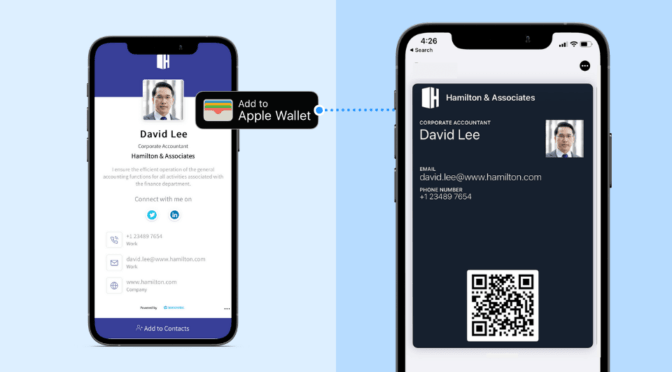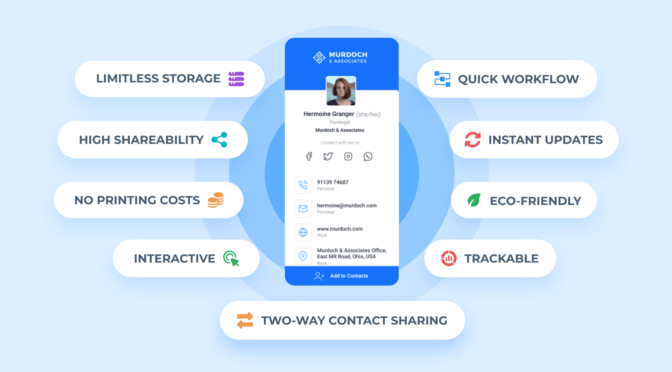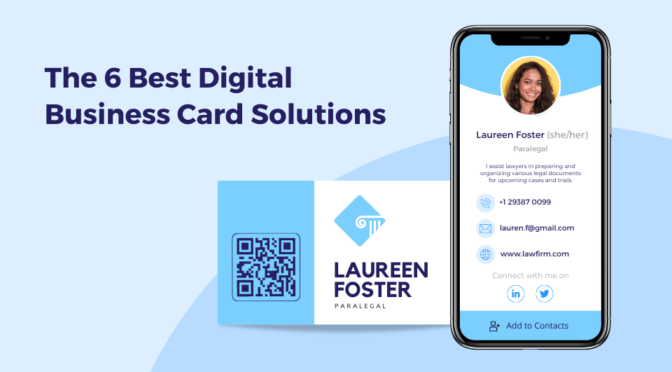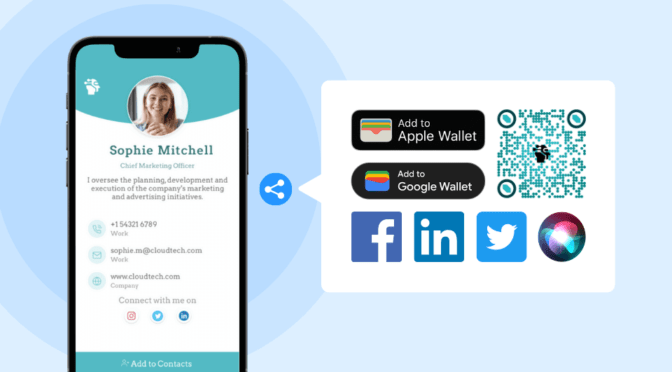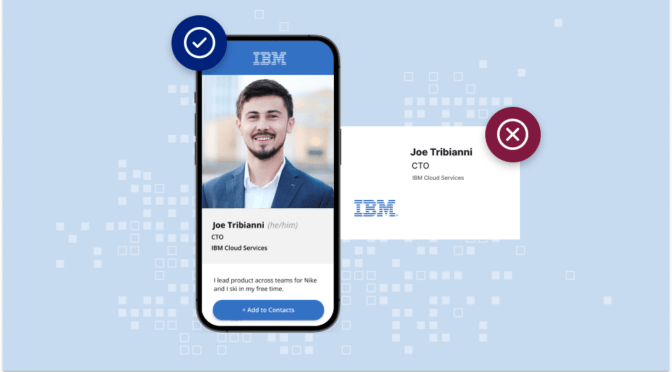The healthcare sector is undergoing a digital transformation. With investments in new technology, innovative approaches are now replacing outdated healthcare practices. This digital overhaul is not limited to aspects involving patient care. It also encompasses healthcare marketing, including networking through business cards.
Today, paper business cards are no longer the most efficient networking tool for healthcare professionals. Without a more suitable alternative, you will face various drawbacks associated with paper business card usage. The most apparent of which is its physical distribution, which compromises contactless healthcare protocols.
The above drawback is just among several.
Due to their numerous disadvantages, paper business cards are now being replaced by digital business cards (or e-business cards). These two data points support this claim:
#1 The global market value for e-business cards is forecasted to reach USD 242.3 Million at an 11.2% CAGR by 2027. (Source: MRFR)
#2 The number of digital business cards healthcare firms have created with Uniqode increased by nearly 150% in the last 6 months vs. the previous period.
A digital business card offers several advantages over its traditional counterparts—not merely in shareability. E-business cards are also more interactive, secure, and can serve as an efficient lead collection tool.
This article discusses the key reasons why healthcare professionals must switch from paper to digital business cards. We will also explore several real-life applications of e-business cards in the medical industry and help you choose the best digital business card solution for your healthcare firm.
Table of contents
- Top reasons why healthcare professionals must shift to digital business cards
- How healthcare professionals utilize digital business cards: 4 real-life applications
- Best digital business card makers for medical professionals
- Frequently asked questions
Top reasons why healthcare professionals must shift to digital business cards
- Share your digital business card via paperless and contactless methods
- Include unlimited valuable and interactive information for your patients
- Safeguard your sensitive data and be policy-compliant
- Eliminate reprinting when updating your business card information
1. Share your digital business card via paperless and contactless methods

COVID-19 encouraged numerous patients to opt for touchless healthcare services. And for this reason, contactless healthcare environments have now become more prevalent.
As mentioned above, paper business cards are only shareable via physical contact—you must distribute them physically to your recipients. If your health institution or private practice provides contactless healthcare services, a paper business card (or other physical business card alternatives) will prove counterintuitive to these offerings.
In contrast, you can share a digital business card using various paperless and contactless methods. For instance, Uniqode lets you send your digital business card to your Apple Wallet or Google Wallet so you can conveniently share it contact-free with a patient. This enables you to interact with your patients in a safe and professional manner.
Through Uniqode, you get various contactless options when sharing your digital business card:
1. Via Apple or Google Wallet
2. Through Apple’s Siri
3. Via a QR Code that can be shared directly on social media or in your email signatures
4. As a URL on diverse channels, including email and SMS
2. Include unlimited valuable and interactive information for your patients

Patients enrolled in a primary healthcare practice tend to pose various inquiries. But due to a doctor’s busy schedule, these inquiries are seldom immediately addressed. During these scenarios, patients are forced to seek the information they need on the web.
You might attempt to counteract this issue by placing various web URLs on your business card to guide patients to additional medical resources. However, if you’re using a paper business card, you will likely encounter challenges regarding content space.
Why? Paper business cards restrict information sharing to a compact 3” x 5” cardstock. Healthcare and mental health professionals often need to share more details than this content space can accommodate.
In addition to this restrictive content space, paper business cards lack interactivity. Even if you add the relevant URLs your patients require, they still need to manually type these URLs on their mobile devices.
A digital business card can help you overcome this spacing and non-interactivity issue.
To educate and better assist your patients, you can include and share unlimited information through your digital business card. In addition to contact details, you can add as many resource URLs and social handles as you think are necessary to help your patients.
The best part is that each of these links is interactive. Upon accessing your interactive digital business card, patients can interact with your URLs, social links, and phone numbers in a click-to-access manner.

3. Safeguard your sensitive data and be policy-compliant
With the ability to share unlimited data comes the need to safeguard it. You may disclose personal and professional details directly or indirectly related to your work or patients when sharing digital cards.
A privacy-first digital business card solution will guarantee that any information on your card is shielded from unauthorized access, thus preventing potential breaches and preserving your reputation.
Look for these security measures in a secured solution:
- HIPAA compliance: It ensures that sensitive healthcare data is handled responsibly and follows legal requirements, often verified through a HIPAA-compliance audit.
- Single Sign-On (SSO): It enables team members to log in once using a single set of credentials, reducing the risk of password leaks and identity theft.
- Multi-Factor Authentication (MFA): This offers team members an additional layer of verification, supplementing their passwords and decreasing the risk of password compromise.
- GDPR compliance: This law regulates how companies use personal data of users located in the European Union. If a business collects, transmits, modifies or stores any personal data of EU citizens, they need to comply with GDPR.
- SOC® Type 1 and 2: SOC Type 1 reports on a service organization’s controls at a point in time, while Type 2 reports on those controls’ operating effectiveness over time.
4. Eliminate business card reprinting when updating your contact information
Running a healthcare practice can be dynamic. At some point, you will have to change the content of your business card.
If you use traditional business cards, even the slightest updates in your contact details will render your business cards outdated. This is true whether you update a single phone number or website URL or move your practice to a different location. Your only means to provide up-to-date information now to your network is by reprinting and redistributing your cards.
The above scenario is in complete contrast to what digital business cards offer.
A digital business card can be updated virtually as and when required. You can edit any information, be it a phone number, interactive URL, or Google Maps location. These updates reflect on your live e-business card in real-time.
Therefore, switching to digital business cards eliminates the needless and costly reprinting that coincides with updating a paper business card. In addition, you ensure your contact details always remain up-to-date for your entire network without redistributing your cards.
Uniqode lets you access the above capabilities, along with other significant digital business card benefits—without downloading any software application.
The entire process—creation, distribution, card analytics—can be performed and accessed without an app. This results in convenient and streamlined usage and saves valuable content space on your device. This is in contrast to how other e-business card solutions necessitate you to download an app for full use of their platform.
How healthcare professionals can utilize digital business cards: 4 real-life applications
- Establishing a two-way communication channel with your patients
- Providing patients with a seamless way to schedule appointments
- Appearing professional during networking events and patient interactions
- Providing quick access to content that solidifies your expertise
1. Establishing a two-way communication channel with your patients
A direct line of patient-doctor communication is one means of providing an exceptional patient experience. Healthcare practices establish this direct contact by handing out paper business cards containing relevant phone numbers.
This approach, however, comes with a significant drawback. These paper business cards require your patients (or their caregivers) to perform manual typing on their mobile devices when accessing your contact information.
This can add to the difficulties already experienced by a patient—especially one with an urgent medical need.
Due to their real-time interactivity, digital business cards allow you to instantly establish a two-way communication channel between you and your patient. Upon saving your card into their mobile device, patients can simply click a contact detail to use it, whether it’s a phone number or email.
When a patient has direct contact with you or your care team, you can immediately be made aware of any urgent medical needs and address them accordingly.
2. Providing patients with a seamless way to schedule appointments

A recent McKinsey report revealed that doctor appointment gaps are often due to physicians and patients having different preferences when working out an appointment schedule.
Continuous availability might not be a luxury most healthcare professionals can offer. But they can always make it easy for patients to navigate setting up an appointment.
This is where a digital business card becomes useful. An e-business card can contain clickable links and social icons to your preferred scheduling services.
For instance, if you use Calendly as your medical appointment scheduling software, you can conveniently display its icon on your digital business card. Icons such as these are accessible via a single tap or click.
Learn more: Add 20+ unique, clickable social media icons to your digital business card
3. Appearing more professional during networking events and patient interactions
Attending healthcare-focused conferences—which always involve exchanging business cards—is an effective way to grow your network. In addition to networking events, you can also leverage existing patient connections to achieve this goal.
One study revealed that resident doctors who hand out business cards are perceived to be better communicators, provide a higher quality of care, and have greater medical expertise than those who don’t. This indicates that business card distribution correlates to enhanced patient satisfaction.
However, if you wish to leverage the above-mentioned benefits, it is crucial to appear professional while sharing your business card. One means to achieve this is by sharing your business card in a contactless manner.
You can accomplish this with a digital business card shared as an Apple Business Card or Google Wallet pass.
Using this method, you simply need to open your wallet pass on your mobile device and share your electronic business card. Upon scanning the QR Code inside your card, your recipient can instantly save your digital business card on their mobile device.
This process does not involve any physical contact and does not require you to hand out any physical medium to be kept for later use. As a result, you make a great first impression and appear more professional when networking.
As a healthcare professional, you might hand out a sizeable number of business cards during networking events. But how would you determine if these cards garner engagement from your recipients?
Using a trackable digital business card solution, you can get the following card-scan metrics to measure the ROI on your networking efforts:
#1 The total number of card scans you receive.
#2 The total number of unique individuals your cards have reached.
#3 The best- and worst-performing digital business cards—based on the total number of scans each card acquired.
#4 The card engagement by location, time of day, and device—you can monitor when and where your patients engage with your e-business card.
4. Providing quick access to content that solidifies your expertise

According to this survey, 81% of patients will choose a healthcare provider based on their online presence. This finding demonstrates the importance of social proof when attracting new patients to a practice.
Medical practitioners can build social proof through various means. This might encompass gathering clinic Google reviews, engaging on social media, and acquiring peer endorsements and testimonials.
You can consolidate these social proofs—including any content that showcases your expertise—in your digital business card. This way, your patients can access them all in one place.
For instance, you can add successive links to your practice’s Google Business profile, your website’s testimonial page, important healthcare-related content, and case studies involving your services.
In addition to clickable URLs, you can add clickable icons of the social platforms you use to engage with your audience (e.g., LinkedIn, Twitter, Facebook, etc.)
Best digital business card makers for medical professionals
To fully leverage the digital business card benefits you learned above, we recommend choosing a dedicated and robust digital business card solution.
The platforms enumerated in the table below were thoroughly evaluated and rated accordingly in this review guide of the best digital business card solutions. As shown, Uniqode takes the lead over other solutions with a rating of 9 out of 10.

As a specialized digital business card solution, Uniqode provides a full suite of features that lets you create the ideal e-business card for your healthcare firm—at scale. Being a security-first platform, Uniqode is the first to become SOC-2 Type-2 certified, making it an industry leader when it comes to enterprise-grade security.
A variety of leading healthcare companies already leverage Uniqode for their digital business card creation, management, and distribution. Some of the most notable ones include Atlantic Health System, Medical Card System, and Eisenhower Health.

Frequently asked questions
How do I create a digital business card for my healthcare practice?
Log in to Uniqode to create a free digital business card for yourself. If you’re looking for a solution for bigger teams, check out the team pricing plans on the platform!
You can learn more about digital business card creation by referring to our easy-to-implement guide on how to create a digital business card.
What should doctors put on their digital business cards?
As a healthcare practitioner, ensure to include the following essential information in your digital business card:
- Full name and titles (e.g., Dr., PhD., MD., etc.)
- Professional headshot
- Professional summary
- Name of practice or health institution
- Practice or health institution address (we recommend using Google Maps)
- Phone numbers and email addresses
- URLs to your website, patient records, and other informational resources
- Relevant social media icons
- Your practice’s branding elements (if applicable)
Get as comprehensive as you need with your e-business card details with Uniqode’s digital business card generator. Flesh out your profile information, add ALL your contact details, then incorporate your brand’s design elements.
Which is the best digital business card maker for healthcare professionals?
Among the best digital business card makers available today, Uniqode is the leading and the most secure solution for creating e-business cards for your healthcare practice. This is because it supports business card sharing through both Apple and Google Wallets—in addition to other contactless distribution methods. The platform provides extensive card customization, team-level analytics, and seamless bulk creation—without forcing a user to download an app.
Kritika is a Senior Content Marketer at Uniqode, where she helps readers navigate networking in a phygital world. She has over 4 years of experience in breaking down complex technology trends into actionable insights for the SAAS domain.Her blogs talk about how business can opt for smarter and sustainable networking practices with digital business cards. When she’s not writing, you’ll probably find her baking something new or hanging out with her dog—who, by the way, has her own digital contact card too.








